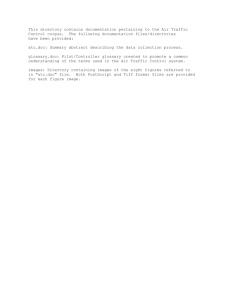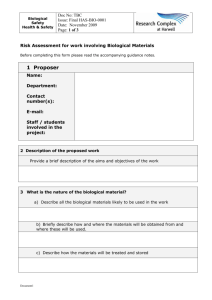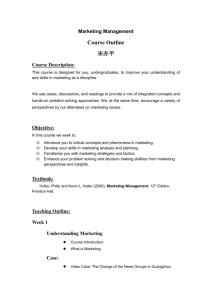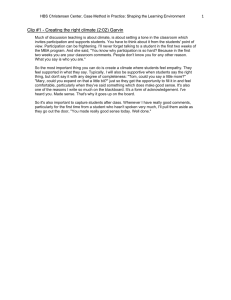Service Marketing Syllabus - Melbourne Global Mobility
advertisement
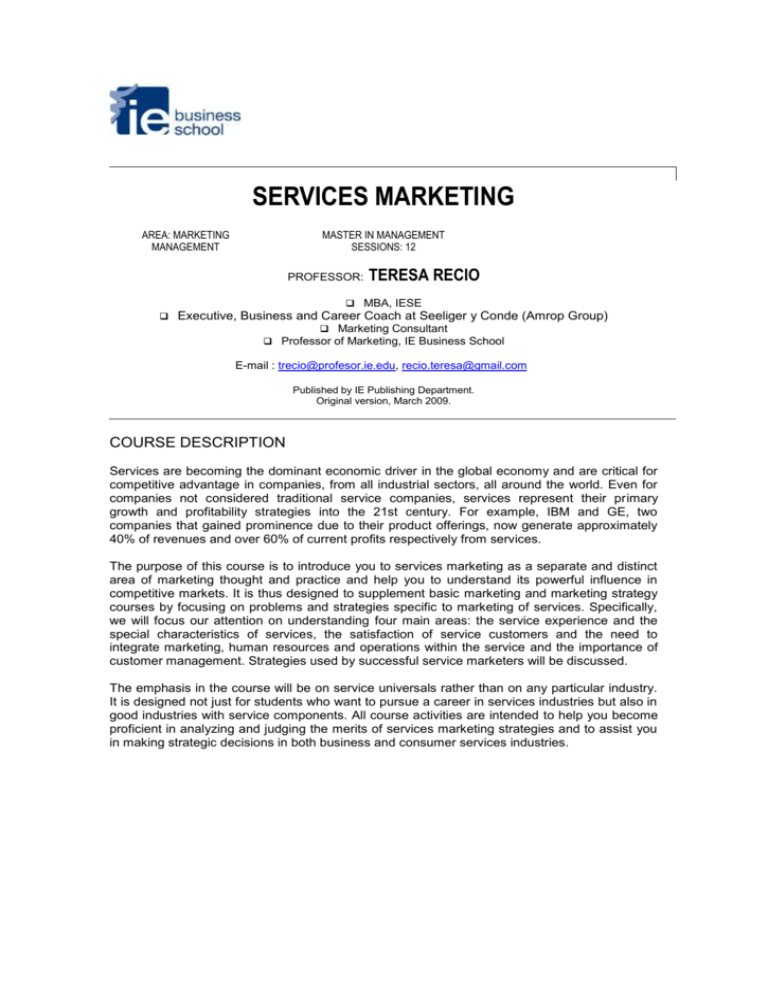
SERVICES MARKETING AREA: MARKETING MANAGEMENT MASTER IN MANAGEMENT SESSIONS: 12 PROFESSOR: TERESA RECIO MBA, IESE Executive, Business and Career Coach at Seeliger y Conde (Amrop Group) Marketing Consultant Professor of Marketing, IE Business School E-mail : trecio@profesor.ie.edu, recio.teresa@gmail.com Published by IE Publishing Department. Original version, March 2009. COURSE DESCRIPTION Services are becoming the dominant economic driver in the global economy and are critical for competitive advantage in companies, from all industrial sectors, all around the world. Even for companies not considered traditional service companies, services represent their primary growth and profitability strategies into the 21st century. For example, IBM and GE, two companies that gained prominence due to their product offerings, now generate approximately 40% of revenues and over 60% of current profits respectively from services. The purpose of this course is to introduce you to services marketing as a separate and distinct area of marketing thought and practice and help you to understand its powerful influence in competitive markets. It is thus designed to supplement basic marketing and marketing strategy courses by focusing on problems and strategies specific to marketing of services. Specifically, we will focus our attention on understanding four main areas: the service experience and the special characteristics of services, the satisfaction of service customers and the need to integrate marketing, human resources and operations within the service and the importance of customer management. Strategies used by successful service marketers will be discussed. The emphasis in the course will be on service universals rather than on any particular industry. It is designed not just for students who want to pursue a career in services industries but also in good industries with service components. All course activities are intended to help you become proficient in analyzing and judging the merits of services marketing strategies and to assist you in making strategic decisions in both business and consumer services industries. OBJECTIVES The course objectives aim to help students to: Gain knowledge of the unique aspects and challenges inherent in marketing and managing the delivery of services or other intangible offerings. Develop the ability to think critically and strategically about opportunities and issues that emerge in service industries and to confidently apply services marketing concepts and frameworks to formulate valuable solutions. Analyze the service delivery process and discover the critical success factors of service quality, based upon evidence from academic research and current views of marketing practitioners. Become more sensitive to key issues in building and managing customer relationships in service industries and to appreciate the importance of customer satisfaction and service recovery as well as the value of loyal customers. SUPPLEMENTAL LEARNING MATERIALS Marketing is a set of skills, concepts, knowledge, analytical techniques and approaches that, when applied appropriately, can greatly improve the efficiency with which business is conducted. This course is designed to further develop these skills, techniques and approaches and to seek appropriate solutions based on reasoning and analysis. An underlying assumption of the course is that students learn best and retain the most through active participation in the learning process. Therefore, classroom sessions will consist of a mixture of lectures, student discussions of assigned materials, case discussions and team presentations. The emphasis in the course will be for you to develop “hands-on” skills and the confidence to apply those skills. Therefore, the main technique to be used for learning is the case method. Each case provides a detailed description of a marketing situation faced by a real marketing manager. You should prepare each case with an action orientation – what would you do if you were the manager? And, just as important, why would you do it? You should be prepared to show the analysis you have used to come to your recommendation. The materials that will be used include the following: Set of business cases and readings: A course pack will be available containing required cases and most readings for the course. Additional readings that will be distributed during the course. GRADES Final grades will be determined by the following evaluation criteria and formula. A description of each component follows. Student grades will be distributed following guidelines provided by the IE Business School. 25% 40% 35% Individual class participation Individual case report Group presentation Class Participation: Active student participation in class is essential to the learning process and to the success of the class. Please note that you will be evaluated on the quality of your interaction, not necessarily the quantity. However, some level of quantity is also necessary. Quality participation moves the discussion along and contributes to collective learning – it adds value to the discussion. Please note that thorough preparation for classes and case discussions is key for constructive participation. 2 As almost all learning is done in the classroom, attendance is required at all class sessions. A missed session will result in a zero grade for that day. Because of the limited number of meetings and the interactive nature of the course it is not possible to make up missed sessions. Please notify the professor in advance if you are unable to attend class due to illness or any other emergency. Case Work: Students are expected to prepare one written report on a business case. This case brief shall be 2 one-side pages maximum of text. You can include exhibits to show quantitative work but please remember that these are not to be included in the 2-page limit. Assignments are due at the beginning of the class when the case in question is discussed and they have to be submitted in paper. A soft copy will also be sent to my e-mail address. Under no circumstances will a brief be accepted after the above mentioned deadline. There will be no exceptions to this rule. Also note that there is a set of “discussion” questions for each case. These questions are chosen to assure that pivotal topics are covered in student preparation, and are not designed to lead directly to a case “solution”. You should therefore use them for guidelines on issues of interest in the case and hints on writing up their report. You should not directly answer the discussion questions in the brief. A very specific format is required for this case brief. You will have it posted on the IE Campus at the beginning of the course. Please note that the problem definition should be very concise and to the point. Do not repeat case facts. It is safe to assume that the reader has read the case and is familiar with the information it contains. Do not waste your valuable (and limited) space by providing a case summary. Papers should be fairly evenly divided between analysis and recommendations. Grading criteria include the following points: Quality of analysis - concise and comprehensive problem statements, appropriate use of course concepts, synthesizing and drawing inferences from case facts, inherent logic, and informative exhibits. Quality of recommendations - specific, comprehensive, and practical plans, recognition of implementation considerations. Writing style and organization - logical structure, clarity, and conciseness. Be sure to follow all previous guidelines before handling your first case brief. Failing to comply would be reflected in your grade. Quizzes: There might be some “pop” announced quizzes during the course. The purpose of this is to make sure that you keep up with the lectures and with the preparation of the cases. Quizzes grading will be included in the 40% of the total grade that corresponds to case work. Final presentation: All students will belong to a group and, during this period, each group will develop an assignment that will be presented in the last session of the course. A more detailed format with the specific topics to be covered in the presentation will be shared with the students at a latter stage. All team members are expected to participate, although the whole group will receive a single grade. Before presenting, each group will handle a hard copy of the presentation and a more detailed written brief, no longer than ten pages, excluding attachments. 3 EXPECTATIONS OF INTEGRITY, RESPECT AND PROFESSIONALISM In class discussions and in any written assignment conducted for this class, you can use whatever notes you have personally prepared. It is strictly forbidden to use notes or assignments from earlier years' classes or any materials prepared by other students. You are encouraged to work together on preparing cases. However, individual reports should be completed without help from others. Listing your name on the group assignment indicates that you have made a substantial contribution to the end product. In all case analyses, you should not go beyond the case in your quest for information. The case provides all of the company facts that should be used in your analysis. Under no circumstances should additional research be conducted. Students are expected to turn off their cell phones. Laptop use in the classroom is strictly prohibited. PROGRAM SESSION 1 Introduction to services marketing and course overview Required Readings: Doc.: “Go Downstream: The New Profit Imperative in Manufacturing," by R. Wise and P. Baumgartner (HBR 99512) SESSION 2 Marketing a customer experience P.C.: “El Bulli: The Taste of Innovation” (HBS 9-509-015) Doc.: “Welcome to the Experience Economy”, by J. Pine and J. Gilmore (HBR 98407) SESSION 3 The service delivery system Required readings: Doc.: “Note on service mapping”, by J.Heskett and R. Anthony (HBS-693065) Doc.: “The art of delivering great customer service”, by D. Stauffer (HMU U9909B) SESSION 4 Delivering excellent service P.C.: “The Ritz Carlton Hotel Company” (HBS-601163) Required readings: Doc.: “Creating the Living Brand”, by N. Bendapundi and V. Bendapundi (HBR R0505G) SESSION 5 Understanding the Service Customer SESSION 6 Customer management Required reading: P.C.: “Marquee: The Business of Nightlife” (HBS 509019) SESSION 7 Customer satisfaction: Expectations and Quality Perception Required reading Doc.: “The Top 10 Reasons you don’t Understand Your Customers”, by F Reichheld (HBSU0605C). Doc.: “The profitable art of service recovery”, by C. Hart, J. Heskett and E. Sasser (HBS90407) SESSION 8 Changing the service business model P.C.: “Radiohead: Music at your own price” (A) (HBS 508110) 4 EN MANO: “Radiohead: Music at your own price” (B) (HBS 508111) SESSION 9 Creating customer equity Required reading: Doc.: “Putting the Service-Profit Chain to work," by J. Heskett, T. Jones, G. Loveman, W. Sasser and L. Schlesinger (HBS-R0807L) SESSION 10 Managing customer value P.C.: “Virgin Mobile USA: Pricing for the very first time” (HBS 504028) Multimedia Doc.: “Customer Lifetime Value” (MK4-109-I-M) SESSION 11 Course wrap-up Required readings: Doc.: “The Service-Driven Service Company”, by L. Schlesinger y J. Heskett (HBR 91511) Doc.: “Lessons in the service sector”, by J. Heskett (HBR 87206) SESSION 12 Group presentations SUPPLEMENTAL READINGS “Services Marketing: Integrating Customer Focus across the Firm”, 4th edition, Valarie Zeithaml, Mary Jo Bitner, and Dwayne Gremler, Boston, MA: McGraw-Hill Irwin, 2006. “Services Marketing”, 6th edition, Christopher Lovelock and Jochen Wirtz: Prentice-Hall, 2006. “Discovering the Soul of Service: The Nine Drivers of Sustainable Business Success”, Leonard L. Berry, New York, NY: The Free Press, 1999. “Blue Ocean Strategy”, Renée Mauborgne and W. Chan Kim, Boston, MA: Harvard Business School Press, 2005. “Call of the Mall”, Paco Underhill, New York, NY: Simon & Schuster, 2004. OTHER INTERESTING DATA TERESA RECIO Marketing expert, has held managing positions in the marketing department of leading multinational companies such as Procter & Gamble and Kellogg. She has also served as an executive advisor, coach or educator at a variety of firms, including Google, Audi and Repsol. 5

